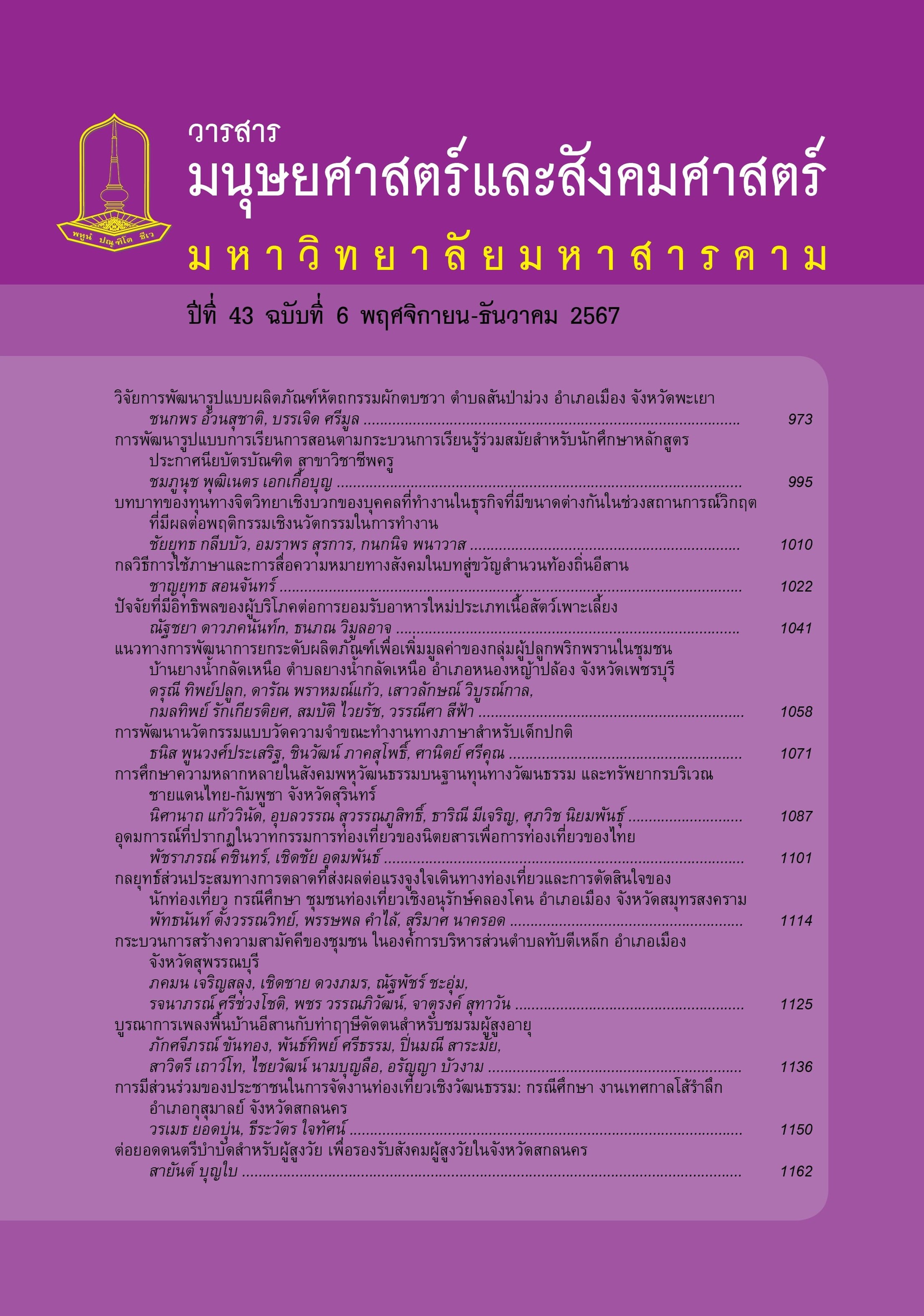บทบาทของทุนทางจิตวิทยาเชิงบวกของบุคคลที่ทำงานในธุรกิจที่มีขนาดต่างกันในช่วงสถานการณ์วิกฤตที่มีผลต่อพฤติกรรมเชิงนวัตกรรมในการทำงาน
Main Article Content
บทคัดย่อ
การวิจัยในครั้งนี้มีวัตถุประสงค์เพื่อวิเคราะห์อิทธิพลปฏิสัมพันธ์ระหว่างทุนทางจิตวิทยาเชิงบวกของบุคคลกับขนาดของธุรกิจที่ส่งผลต่อพฤติกรรมเชิงนวัตกรรมในการทำงานช่วงสถานการณ์วิฤต ตัวอย่างวิจัยเป็นบุคลากรที่ทำงานในธุรกิจวิสาหกิจขนาดกลางและขนาดย่อม ได้จากการสุ่มตัวอย่างอย่างอย่างง่าย จำนวน 320 คน วิเคราะห์ผลด้วยสมการถดถอยพหุแบบขั้นตอนระดับลดหลั่น ผลการวิจัยพบว่า ตัวแปรทำนายทั้งหมดสามารถอธิบายความแปรปรวนของพฤติกรรมเชิงนวัตกรรมในการทำงานได้ร้อยละ 60 (R2 = .60) F(3, 316) = 157.16, p < .05 โดยอิทธิพลปฏิสัมพันธ์ระหว่างทุนทางจิตวิทยาเชิงบวกกับขนาดของธุรกิจมีอิทธิพลทางบวกต่อพฤติกรรมเชิงนวัตกรรมในการทำงาน (β = .09, p = .02) ซึ่งความสัมพันธ์ในทิศทางบวกที่เกิดขึ้นแสดงให้เห็นว่าทุนทางจิตวิทยาเชิงบวกกับพฤติกรรมเชิงนวัตกรรมในการทำงานช่วงสถานการณ์วิกฤตจะเข้มแข็ง โดยเฉพาะบุคลากรที่ทำงานในธุรกิจวิสาหกิจขนาดย่อม
Article Details
เอกสารอ้างอิง
คมน์ พันธรักษ์. (2563). การบริหารธุรกิจ SMEs ในช่วงวิกฤตของโรคระบาด COVID-19. สืบค้นจาก https://www.tbs.tu.ac.th
รักษ์ วรกิจโภคาทร (2561). เอกสารประกอบการบรรยายเรื่องการบริหารคนบนโลกแห่งความผันผวน Managing human resources in a VUCA world. สืบค้นจาก https://ocsc.go.th
สำนักงานส่งเสริมวิสาหกิจขนาดกลางและขนาดย่อม (2563). รายงานสถานการณ์ MSMES ปี 2563. สืบค้นจาก https://www.SMEs.go.th/
Alat, P., Das, S. S., Arora, A., & Jha, A. K. (2021). Mental health during COVID-19 lockdown in India: Role of psychological capital and internal locus of control. Curr Psychol, 1-13. https://doi.org/10.1007/s12144-021-01516-x
Alexander, L., & Van Knippenberg, D. (2014). Teams in pursuit of radical innovation: A goal orientation perspective. Academy of Management review, 39(4), 423-438.
Ali, A., Abbas, S. F., Khattak, M. S., Arfeen, M. I., Ishaque Chaudhary, M. A., & Yousaf, L. (2022). Mediating role of employees’ intrinsic motivation and psychological safety in the relationship between abusive supervision and innovative behavior: An empirical test in IT sector of Pakistan. Cogent Business & Management, 9(1), 2039087.
Asurakkody, T. A., & Shin, S. Y. (2018). Innovative behavior in nursing context: A concept analysis. Asian Nursing Research, 12(4), 237-244.
Bandura, A. (1999). A social cognitive theory of personality. In L. Pervin & O. John (Ed.), Handbook of personality (2nd ed., pp. 154-196). Guilford Publications. (Reprinted in D. Cervone & Y. Shoda [Eds.], The coherence of personality. New York: Guilford Press.)
Chang, J. C., & Yang, Y. L. (2012). The effect of organization’s innovational climate on student’s creative self-efficacy and innovative behavior. Business & Entrepreneurship Journal, 1(1), 75-100.
Cao, F. and Zhang, H. (2020). Workplace friendship, psychological safety and innovative behavior in China: A moderated-mediation model. Chinese Management Studies, 14(3), 661-676. https://doi.org/10.1108/CMS-09-2019-0334
Etikariena, A. (2018). The effect of psychological capital as a mediator variable on the relationship between work happiness and innovative work behavior. Diversity in unity: Perspectives from psychology and behavioral sciences, 23, 379-386.
Grözinger, A. C., Wolff, S., Ruf, P. J., & Moog, P. (2021). The power of shared positivity: organizational psychological capital and firm performance during exogenous crises. Small Bus Econ, 58, 689–716. https://doi.org/10.1007/s11187-021-00506-4
Gu, H., Duverger, P., & Yu, L. (2017). Can innovative behavior be led by management? A study from the lodging business. Tourism Management, 63, 144-157. dx.doi.org/10.1016/j.tourman.2017.06.010
Hair, J. F., Ringle, C. M., & Sarstedt, M. (2010). PLS-SEM: Indeed a silver bullet. Journal of Marketing theory and Practice, 19(2), 139-152.
Janssen, O. (2000). Job demands, perceptions of effort-reward fairness and innovative work behaviour. Journal of Occupational and Organizational Psychology, 73(3), 287-302.
Kleysen, R. F., & Street, C. T. (2001). Toward a multi‐dimensional measure of individual innovative behavior. Journal of Intellectual Capital, 2(3), 284-296, DOI:10.1108/EUM0000000005660
Korzilius, H., Bücker, J. J. L. E., & Beerlage, S. (2017). Multiculturalism and innovative work behavior: The mediating role of cultural intelligence. International Journal of Intercultural Relations, 56, 13-24. doi:10.1016/j.ijintrel.2016.11.001
Kuckertz, A., Brändle, L., Gaudig, A., Hinderer, S., Reyes, C. A. M., Prochotta, A., ... & Berger, E. S. (2020). Startups in times of crisis–A rapid response to the COVID-19 pandemic. Journal of Business Venturing Insights, 13, e00169.
Luthans F, Avolio BJ, Walumbwa FO, et al. (2005). The psychological capital of Chinese workers: Exploring the relationship with performance. Management and Organization Review 1(2), 249–271.
Messmann, G., & Mulder, R. H. (2012). Development of a measurement instrument for innovative work behaviour as a dynamic and context-bound construct. Human Resource Development International, 15(1), 43-59.
Mchiri, A. (2022). Psychological capital and SMEs performance: The role of innovative behavior and risk propensity. Journal of the International Council for Small Business, 3(2), 176-183.
Mutonyi, B.R. (2021). Employees’ psychological capital and innovative behavior in higher education. International Journal of Quality and Service Sciences. 13(2), 198-215. https://doi.org/10.1108/IJQSS-02-2020-0024
Pandey, A., Gupta, V., & Gupta, R. K. (2019). Spirituality and innovative behaviour in teams: Examining the mediating role of team learning. IIMB Management Review, 31(2), 116-126.
Rahmaningtyas, W., Widhiastuti, R., & Farliana, N. (2022). Organizational Support, Workplace Friendship, and Innovative Behavior among Indonesian University Faculty. The Journal of Behavioral Science, 17(2), 42-57.
Riaz, S., Xu, Y., & Hussain, S. (2018). Understanding employee innovative behavior and thriving at work: A Chinese perspective. Administrative Sciences, 8(3), 46.
Scott, S. G., & Bruce, R. A. (1994). Determinants of innovative behavior: A path model of individual innovation in the workplace. Academy of management journal, 37(3), 580-607.
Slåtten, T., Mutonyi, B. R., & Lien, G. (2020). The impact of individual creativity, psychological capital, and leadership autonomy support on hospital employees’ innovative behaviour. BMC health services research, 20(1), 1-17.
Turliuc, M. N. and Candel, O. S. (2021). Not All in the Same Boat. Socioeconomic Differences in Marital Stress and Satisfaction During the Covid-19 Pandemic. Front. Psychol. 12:635148. doi: 10.3389/fpsyg.2021.635148
Uen, J.-F., Vandavasi, R.K.K., Lee, K., Yepuru, P. and Saini, V. (2021). Job crafting and psychological capital: a multi-level study of their effects on innovative work behaviour. Team Performance Management, 27(1/2), 145-158. https://doi.org/10.1108/TPM-08-2020-0068
Wang Y, Chen Y and Zhu Y (2021) Promoting Innovative Behavior in Employees: The Mechanism of Leader Psychological Capital. Front. Psychol. 11:598090. doi: 10.3389/fpsyg.2020.598090
Wojtczuk-Turek, A. (2012). Innovative work behavior and psychological capital–analysis of relationships. Organizacja i Zarządzanie: kwartalnik naukowy, 3(19), 71-88.
Williams, T. A., Gruber, D. A., Sutcliffe, K. M., Shepherd, D. A., & Zhao, E. Y. (2017). Organizational response to adversity: Fusing crisis management and resilience research streams. Academy of Management Annals, 11(2), 733-769.


